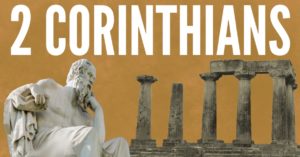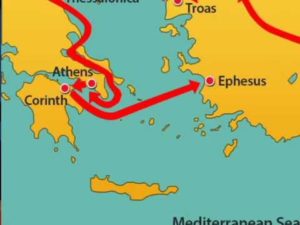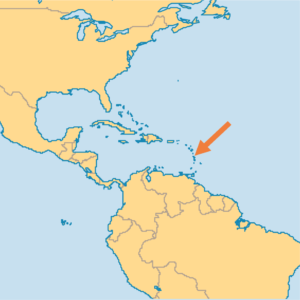AUGUST 26- TODAY’S READING FROM THE ONE YEAR BIBLE- JOB 20:1-22:30;
2 CORINTHIANS 1:1-11; PSALM 40:11-17; PROVERBS 22:2-4
TODAY’S READING FROM THE OLD TESTAMENT- JOB 20:1-22:30.
 This is Zophar’s second response to Job. Still, Zophar imagines that there must be some unconfessed sin in Job’s life that has provoked God to allow his misfortune.
This is Zophar’s second response to Job. Still, Zophar imagines that there must be some unconfessed sin in Job’s life that has provoked God to allow his misfortune.
Zophar has no idea what God is doing in Job’s life. Sometimes God allows suffering in the lives of those who trust Him for purposes known only to Himself.
Job repudiates Zophar’s assumption and declares that, contrary to Zophar’s pontificating in Chapter 20, sometimes the wicked do prosper and appear to die in peace and with plenty (21:1-18). But that is not the full story.
Job is the first of many in the Bible to question why the wicked prosper:
Job 21:7 7 “Why do the wicked still live, continue on, also become very powerful?
David asks the question again in the Psalms:
Psalm 94:3 3 How long shall the wicked, O LORD, how long shall the wicked exult?
Jeremiah also laments this fact:
Jeremiah 12:1 1 Righteous are You, O LORD, that I would plead my case with You; Indeed, I would discuss matters of justice with You: Why has the way of the wicked prospered? Why are all those who deal in treachery at ease?
The Word of God reminds us to judge nothing before the time comes. The Day of Judgment will declare what true success and prosperity really is.
Jesus taught that we dare not assess a person’s success by their apparent wealth, health, and achievements. He describes the plight of a rich man who appeared to be money-smart and successful:
Luke 12:18-20 18 “Then he (the rich man) said, ‘This is what I will do: I will tear down my barns and build larger ones, and there I will store all my grain and my goods. 19 And I will say to my soul, ‘Soul, you have many goods laid up for many years to come; take your ease, eat, drink and be merry.’ 20 “But God said to him, ‘You fool! This very night your soul is required of you; and now who will own what you have prepared?’ 21 So is the man who stores up treasure for himself, and is not rich toward God.”
God saw Job as a man who was rich towards him. Remember the first verse of Chapter 1:
Job 1:1 1 There was a man in the land of Uz whose name was Job; and that man was blameless, upright, fearing God and turning away from evil.
Job answers his critics:
Job 21:34 34 “How then will you vainly comfort me, for your answers remain full of falsehood?”
 Eliphaz, Bildad, and Zophar have had two rounds of accusations according to their religious philosophy. They say things that may be true in some cases, but not in Job’s case. Therefore, they were full of falsehood. Job put no confidence in what they were saying. The Lord will back Job up in this assessment.
Eliphaz, Bildad, and Zophar have had two rounds of accusations according to their religious philosophy. They say things that may be true in some cases, but not in Job’s case. Therefore, they were full of falsehood. Job put no confidence in what they were saying. The Lord will back Job up in this assessment.
 Eliphaz begins the third round of debate offering fuzzy theology, accusation, and wrangling over Job’s character. He makes the accusation that Job is a sinner (22.1-11), that he is hiding his sins (22:12-20), and that he must repent, and confess his sins if he expects God is to help him (22:21-30).
Eliphaz begins the third round of debate offering fuzzy theology, accusation, and wrangling over Job’s character. He makes the accusation that Job is a sinner (22.1-11), that he is hiding his sins (22:12-20), and that he must repent, and confess his sins if he expects God is to help him (22:21-30).
This passage makes you wonder how well Eliphaz knew Job, for his assessment of Job’s character is very different from God’s in Job 1:1.
How do you handle people who falsely evaluate your life?
How grounded are you in what God has to say about you?
Eliphaz says many things that are true pertaining to getting right with God (Job 22:21-30). Had he applied them to his own life, he might have been a greater comfort to Job!
TODAY’S READING FROM THE NEW TESTAMENT – 2 CORINTHIANS 1:1-11
 Today we start Paul’s second letter to the Corinthians. This is the most autobiographical account we have of Paul’s life in the New Testament.
Today we start Paul’s second letter to the Corinthians. This is the most autobiographical account we have of Paul’s life in the New Testament.
Corinth, you may remember was the fourth largest city in the Roman Empire; after Rome, Alexandria, and Antioch. It covered a territory of 330 square miles.
The original city, one of the Greek city-states, was destroyed in 146 BC in a revolt against the Roman Empire. It was rebuilt in the time of Julius Caesar (around 46 BC) and resettled with freed slaves from Italy.
Corinth had commercial importance with two port harbors, one on the Adriatic and one on the Aegean Sea. It was known as a sailor’s port with rampant immorality.
 Paul wrote 2 Corinthians from Macedonia a year or so after 1 Corinthians, during his third missionary journey (AD 55-56 AD). Paul was converted in 33-34 AD, first preaching in Corinth on his second missionary journey, 16 years later in 49-51 AD. He met up with fellow tentmakers, Aquila and Priscilla who became partners in his church planting enterprise there and later in Ephesus (Acts 18:2). When Paul first preached in Corinth, there was fierce persecution. But the Lord assured him that He had many people in that city (Acts 18:10). So Paul stayed on there for 18 months, teaching the Word of God (Acts 18:11).
Paul wrote 2 Corinthians from Macedonia a year or so after 1 Corinthians, during his third missionary journey (AD 55-56 AD). Paul was converted in 33-34 AD, first preaching in Corinth on his second missionary journey, 16 years later in 49-51 AD. He met up with fellow tentmakers, Aquila and Priscilla who became partners in his church planting enterprise there and later in Ephesus (Acts 18:2). When Paul first preached in Corinth, there was fierce persecution. But the Lord assured him that He had many people in that city (Acts 18:10). So Paul stayed on there for 18 months, teaching the Word of God (Acts 18:11).
While at Corinth, he wrote letters to the Thessalonians and Galatians.
After his 18-month ministry in Corinth, Paul continued to travel. He teaches for three years at the hall of Tyrannus in Ephesus. It was when he was visiting the churches in Macedonia that Titus gave him the updated report about the church in Corinth that provoked Paul to write this letter.
This is the 4th letter that he wrote to this church. Two of his letters are missing, but are referenced in 1 Corinthians 5:9 and 2 Corinthians 2:3-4.
According to tradition, Paul returned to Corinth and spent the winter of 56-57 in the home of Gaius. (See Romans 16:23; 1 Cor 1:14). From there he wrote the epistle to the Romans.
The central theme in Paul’s second letter to the Corinthians is the relationship between suffering and the power of the Spirit in Paul’s life and ministry.
Some of his opponents, including professing believers, argued that Paul suffered too much to be a Spirit-filled apostle of the risen Christ. Paul argues that his suffering is an instrument God uses to reveal his glory. His personal weakness is a platform for the manifestation of God’s grace.
Paul begins the letter giving praise to the God and Father of our Lord Jesus Christ as ‘the Father of mercies’ and the ‘God of all comfort’!
 How does Paul know Him as such? He reports that he has firsthand experience of God’s mercy and comfort, and that he wants them to know Him this way also.
How does Paul know Him as such? He reports that he has firsthand experience of God’s mercy and comfort, and that he wants them to know Him this way also.
He writes of his affliction in Asia. His sufferings were not just physical, but also mental and emotional. He felt the continual pressure of persecution and relentlessly had to battle false teachers. He writes of his facing hardships (2 Cor 1:8) the sentence of death (v.9), and deadly peril (v.10).
Paul dignified the trials by seeing their redemptive value:
2 Corinthians 1:6 6 But if we are afflicted, it is for your comfort and salvation; or if we are comforted, it is for your comfort, which is effective in the patient enduring of the same sufferings which we also suffer.
Have you been learning these life lessons that Paul is sharing with the Corinthians?
- God comforts us so that we can comfort others.
- God allows us to come to the end of ourselves, so that we may not rely on ourselves but on Him and His resurrection power.
- God teaches us to trust Him as our deliverer, so that the praise is brought to Him!
- Paul knows the effective power of prayer (2 Cor 1:11).
TODAY’S READING FROM THE BOOK OF PSALMS- PSALM 40: 11-17
 Psalm 40 relates well to the other passages we are reading today. Paul knew that the Lord was His deliverer. Job also looked to the Lord to vindicate him in the trial. He puts His trust in God’s mercy. Here the Psalmist looks to the Lord to deliver him according to His love and faithfulness (40: 13) and praises Him as the One who comes to His rescue:
Psalm 40 relates well to the other passages we are reading today. Paul knew that the Lord was His deliverer. Job also looked to the Lord to vindicate him in the trial. He puts His trust in God’s mercy. Here the Psalmist looks to the Lord to deliver him according to His love and faithfulness (40: 13) and praises Him as the One who comes to His rescue:
Psalm 40:16-17 16 Let all who seek You rejoice and be glad in You; Let those who love Your salvation say continually, “The LORD be magnified!” 17 Since I am afflicted and needy, let the Lord be mindful of me. You are my help and my deliverer; Do not delay, O my God.
TODAY’S READING FROM THE BOOK OF PROVERBS- PROVERBS 22:2-4
Proverbs 22:2-4 2 The rich and the poor have a common bond, The LORD is the maker of them all. 3 The prudent sees the evil and hides himself, But the naive go on, and are punished for it. 4 The reward of humility and the fear of the LORD are riches, honor and life.
God’s wisdom calls us to acknowledge Him as being true to His Word. We should not be naïve, but recognize that we are living in a fallen world and must take precautions, humbly submitting to the light of God’s Word.
And the rewards for doing so are great!
PRAY FOR THE NATIONS – MARTINIQUE
Department of Martinique
Caribbean
Geography
A volcanic island in the eastern Caribbean Sea. The most northerly of the Windward Islands, and 100 km south of its sister island, Guadeloupe.
Population: 406,001 Annual Growth: 0.39%
Capital: Fort-de-France
Urbanites: 89.1%
Peoples
Official language: French. Créole Martiniquais is widely spoken Languages: 3 All languages
Religion
Largest Religion: Christian
|
Religion |
|
Pop % |
Ann Gr |
|
388,949 |
95.80 |
0.4 |
|
|
24,861 |
6.1 |
1.6 |
Challenges for Prayer
Martinique can be a dangerous place to live. It periodically suffers major volcanic eruptions and earthquakes – in 1902, Mt. Pelée erupted, killing 30,000. Tropical storms and misuse of pesticides are more recent blights upon the population. But spiritual apathy is the most dangerous element that grips much of the population. Pray that they may see their basic instability and be shaken out of their carelessness about the things of God.
PRAYER: Lord we are grateful that You are mindful of us. You know our frailties and failings. You remember that we are dust. We are grateful that You, the infinitely Holy One, have made Yourself known as the Father of mercies and the God of all comfort. We take no pride in our weaknesses, other than that they serve as a platform for the manifestation of Your grace. We rest in the position of favor that the Lord Jesus has won for us. We delight in the fact that You rejoice over us with singing, knowing that we are hid in a faith-union with Christ, our Lord and our Life. We ask that You enable us to stand against all the accusations of the evil One with all the assurances of the Victory You have given us. In Jesus’ Name. Amen.
-Pastor David


